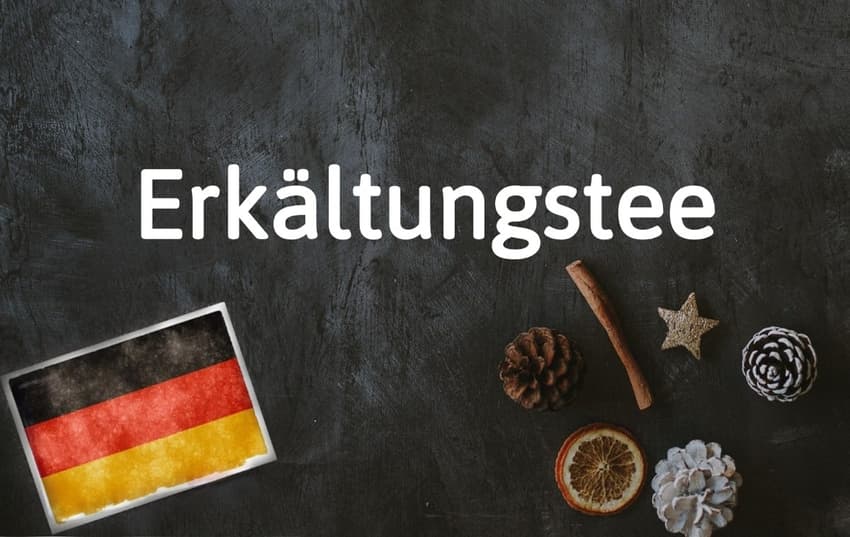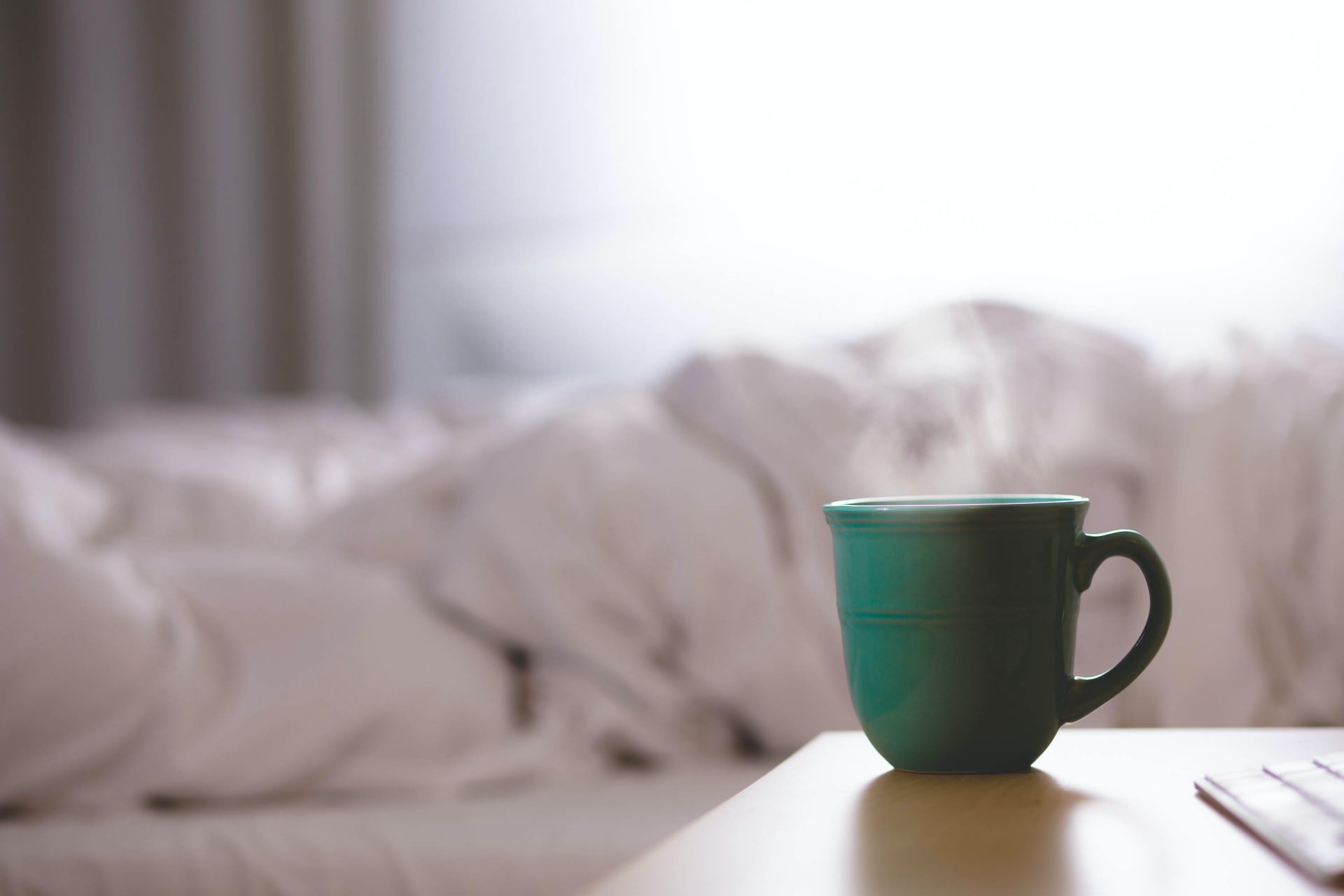German word of the day: Erkältungstee

Whether being advised by a doctor to drink this or seeing dozens of varieties in shops and pharmacies, this is a German word and concept you must know in winter.
Why do I need to know Erkältungstee?
Because you're going to come across this a lot in Germany, especially during colder weather, and it emphasises just how seriously Germans take herbal drinks as a cure or preventative measure for many ailments.
What does it mean?
Der Erkältungstee, which sounds like this, and is sometimes written as two words (Erkältungs Tee) translates to 'cold tea' - but it has nothing to do with the temperature. Die Erkältung in German is the word for the common cold. So this is a tea aimed at easing your cold symptoms or even preventing colds.
There are many types of Erkältungstees with different ingredients aimed at soothing your complaints.
Some are sold with the classic title of Erkältungstee on the packaging. You can be sure that this tea will be full of medicinal herbs to soothe your banging headache and fatigue.
But there are plenty more on the market. For instance, 'cold tea' with echinacea is meant to strengthen the immune system. If you're already having aches and fever, then Lindenblütentee or 'linden blossom tea' is the Erkältungstee for you.
Anis (Anise) and Fenchel (Fennel) are said to have a calming effect on the stomach and help with blocked sinuses. Kamille (chamomile) teas mixed with Honig (honey) are very popular for soothing your throat.

Ingwer (ginger) tea is recommended for its anti-inflammatory effects, which can help relieve various symptoms.
Some teas will show you exactly what they're for. For instance, Reizhusten Tee should help your 'bad cough'.
But this isn't just about a hot drink to sip when you're under the weather, it sums up what appears to many as the German obsession with tea to fix everything.
Foreigners living in Germany sometimes joke that they have been prescribed tea by their Hausarzt (GP) instead of stronger medication, like painkillers or other drugs.
The part of being self employed in Germany that will never make to sense to me: my health insurance is nearly double my rent, but I can't afford to get sick because then I can't work.
On top of that, several hundred Euros per month to be prescribed tea isn't much fun.
— Jonny Whitlam Berlin Guide (@WhitlamsBerlin) December 14, 2023
The fact is that Germans do take herbal and natural solutions seriously.
Steam inhalations and foot baths of hot water mixed with herbs such as eucalyptus, primrose, elderberry or thyme are also beloved remedies for clearing airways and easing fevers.
For sore throats, gargling warm water mixed with salt is a commonly used remedy in Germany. Some Germans even turn to homemade recipes for cough syrups, such as mixing onion and honey.
Going to the sauna regularly is also a part of German wellness culture.
Some of these remedies - including Erkältungstee - can indeed provide relief. But when you need something stronger, don't hesitate to make your feelings known to the doctor.
I'm tried of being prescribed to drink tea or more water in Germany.
I'm Iranian, if I'm in the clinic that means none of the home remedies have worked. Give me the real stuff!
— Negar Jamalifard (@NegarDev) June 20, 2022
READ ALSO: Five ways to fight colds like a true German
How to use it:
(At the doctor) Ich habe es mit Erkältungstee versucht, aber mein Husten wird immer schlimmer. Brauche ich Arzneimittel?
I have tried 'cold tea', but my cough is getting worse. Do I need medication?
(At the pharmacy) Welche Art von Erkältungstee empfehlen Sie beim Halsschmerzen und Schnupfen?
What kind of tea do you recommend for a sore throat and sniffles?
Comments
See Also
Why do I need to know Erkältungstee?
Because you're going to come across this a lot in Germany, especially during colder weather, and it emphasises just how seriously Germans take herbal drinks as a cure or preventative measure for many ailments.
What does it mean?
Der Erkältungstee, which sounds like this, and is sometimes written as two words (Erkältungs Tee) translates to 'cold tea' - but it has nothing to do with the temperature. Die Erkältung in German is the word for the common cold. So this is a tea aimed at easing your cold symptoms or even preventing colds.
There are many types of Erkältungstees with different ingredients aimed at soothing your complaints.
Some are sold with the classic title of Erkältungstee on the packaging. You can be sure that this tea will be full of medicinal herbs to soothe your banging headache and fatigue.
But there are plenty more on the market. For instance, 'cold tea' with echinacea is meant to strengthen the immune system. If you're already having aches and fever, then Lindenblütentee or 'linden blossom tea' is the Erkältungstee for you.
Anis (Anise) and Fenchel (Fennel) are said to have a calming effect on the stomach and help with blocked sinuses. Kamille (chamomile) teas mixed with Honig (honey) are very popular for soothing your throat.

Ingwer (ginger) tea is recommended for its anti-inflammatory effects, which can help relieve various symptoms.
Some teas will show you exactly what they're for. For instance, Reizhusten Tee should help your 'bad cough'.
But this isn't just about a hot drink to sip when you're under the weather, it sums up what appears to many as the German obsession with tea to fix everything.
Foreigners living in Germany sometimes joke that they have been prescribed tea by their Hausarzt (GP) instead of stronger medication, like painkillers or other drugs.
The part of being self employed in Germany that will never make to sense to me: my health insurance is nearly double my rent, but I can't afford to get sick because then I can't work.
— Jonny Whitlam Berlin Guide (@WhitlamsBerlin) December 14, 2023
On top of that, several hundred Euros per month to be prescribed tea isn't much fun.
The fact is that Germans do take herbal and natural solutions seriously.
Steam inhalations and foot baths of hot water mixed with herbs such as eucalyptus, primrose, elderberry or thyme are also beloved remedies for clearing airways and easing fevers.
For sore throats, gargling warm water mixed with salt is a commonly used remedy in Germany. Some Germans even turn to homemade recipes for cough syrups, such as mixing onion and honey.
Going to the sauna regularly is also a part of German wellness culture.
Some of these remedies - including Erkältungstee - can indeed provide relief. But when you need something stronger, don't hesitate to make your feelings known to the doctor.
I'm tried of being prescribed to drink tea or more water in Germany.
— Negar Jamalifard (@NegarDev) June 20, 2022
I'm Iranian, if I'm in the clinic that means none of the home remedies have worked. Give me the real stuff!
READ ALSO: Five ways to fight colds like a true German
How to use it:
(At the doctor) Ich habe es mit Erkältungstee versucht, aber mein Husten wird immer schlimmer. Brauche ich Arzneimittel?
I have tried 'cold tea', but my cough is getting worse. Do I need medication?
(At the pharmacy) Welche Art von Erkältungstee empfehlen Sie beim Halsschmerzen und Schnupfen?
What kind of tea do you recommend for a sore throat and sniffles?
Join the conversation in our comments section below. Share your own views and experience and if you have a question or suggestion for our journalists then email us at [email protected].
Please keep comments civil, constructive and on topic – and make sure to read our terms of use before getting involved.
Please log in here to leave a comment.